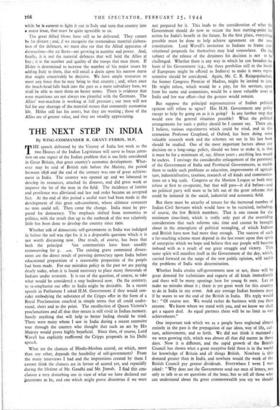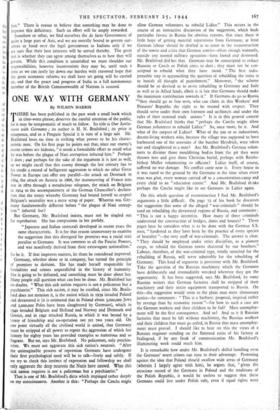THE NEXT STEP IN INDIA
By WING-COMMANDER R. GRANT-FERRIS, M.P.
THE speech delivered by the Viceroy of India last week to the two Houses of the Indian Legislature will serve to focus atten- tion on one aspect of the Indian problem that is too little considered in Great Britain, that great country's economic development. What- ever may be said of British rule before the Mutiny, the period between 1858 and the end of the century was one of great achieve- ment in India. The country was opened up and we laboured to develop its resources, attacked its diseases, and did great work to improve the lot of the man in the field. The incidence of famine and pestilence was alleviated and law and order became an accepted fact. At the end of this period a useful start had been made in the development of this great sub-continent, whose ultimate resources no man could tell. Then came the change. India must be pre- pared for democracy. The emphasis shifted from economics to politics, with the result that up to the outbreak of this war relatively little has been done to develop the country since woo.
Whether talk of democratic self-government in India was indulged in before the soil was ripe lot it is a disputable question which it is not worth discussing now. One result, of course, has been that
both the principal -Ilan communities have been • steadily
manoeuvring for The existing grave communal dissen- sions are the direct result of pressing democracy upon India before educational preparation of a reasonable proportion of the people had been made. For our mistaken policy in the past we are paying dearly today, when it is found necessary to place many thousands of Indians under restraint. It is out of the question, of course, to take what would be considered a step backward now. On the contrary, to re-emphasise our offer to India might be desirable. In a recent speech in Parliament I asked H.M. Government if they would con- sider embodying the substance of the Cripps offer in the form of a Royal Proclamation couched in simple terms that all could under- stand, short and to the point. The recollection of Queen Victoria's proclamations and all that they meant is still vivid in Indian memory. Surely anything that will help to better feeling should be tried. There were many whom I saw in India during a recent extensive tour through the country who thought that such an act by His Majesty would prove highly beneficial. Since then, of course, Lord Wavell has explicitly reaffirmed the Cripps proposals in his Delhi speech.
What are the chances of Hindu-Moslem accord, on which, more than any other, depends the feasibility of self-government? From the many interviews I had and the impressions created by them I cannot think the chances are in favour of accord yet, and especially during the lifetime of Mr. Gandhi and Mr. Jinnah. I find this con- clusion a very disturbing one in view of what we have declared our intentions to be, and one which might prove disastrous if we were not prepared for it. This leads to the consideration of what the Government should do now to secure the best starting-point for action for India's benefit in the future. In the first place, everything possible must be done to help achieve agreement on the nev, constitution. Lord Wavell's invitation to Indians to frame con- stitutional proposals for themselves may lead somewhere. On the subject of the release of the detainees his decision is not to be challenged. Whether there is any way in which he can broaden the basis of his Government (e.g., the three portfolios still in the hands of Europeans might be offered to Indians) to make it more repre- sentative should be considered. Again, Mr. C. R. Rajagopalachan, the former Congress Premier of Madras, might be invited to join. He might refuse, which would be a pity, for his services, apart from his name and connexions, would be a most valuable asset to India and her war effort—but the gesture would remain.
But suppose the principal representatives of Indian political opinion still refuse to agree? Has H.M. Government any policy except to help by going on as it is going? Is any further step that would ease the general situation possible? What the political arrangements for such a policy should be I cannot say. There are I believe, various experiments which could be tried, and in this connexion Professor Coupland, of Oxford, has been doing some valuable research work and the schemes set out in his last book should be studied. One of the most important factors about any decision on a long-range policy, should we have to make it, is that it must be for a minimum of, say, fifteen years ; anything less would be useless. I envisage the considerable enlargement of the personnel of the Government of India and Provincial Governments, to enable them to tackle such problems as education, improvement of agricul- ture, industrialisation, taxation, research of all kinds and communica- tions on a big scale. Congress or the Moslem League or both may refuse at first to co-operate, but that will pass—it did before—and no political party will want to be left out of the great reforms that could be initiated in the social, industrial and economic field.
But there must be security of tenure for the increased number of Indian Civil Servants which would have to be recruited, including, of course, the few British members. That is one reason for the minimum time-limit, which is really only part of the overriding consideration that such reforms take time and cannot be brought about in the atmosphere of political wrangling, of which Indians and British have now had more than enough. The success of such a far-reaching scheme must depend in the last resort upon that spirit of enterprise which we hope and believe that our people will become imbued with as a result of our great struggle and victory. This same spirit will manifest itself in the Government of the day, which. carried forward on the surge of the new public opinion, will tackle the problems of India with determination.
Whether India attains self-government now or not, there will be great demand for technicians and experts of all kinds immediately and there will be many openings here for young fit men. Let us make no mistake about it ; there is yet great work for this country to do in India in any event. Ask any average Indian business man if he wants to see the end of the British in India. His reply would be: "Of course not. We would rather do business with you than anyone. We know where we stand with you, and we know we shall get a square deal. As equal partners there will be no limit to our achievements."
One important task which we as a people have neglected almost entirely in the past is the propagation of our ideas, way of life, cul ture, achievements, and so forth. We did not think it mattered we were growing rich, which was almost all that did matter in those days. Now it is different, and the rapid growth of the British Council has shown what a great receptive field there is in the world for knowledge of Britain and all things British. Nowhere is this demand greater than in India, and nowhere would the work of the British Council pay greater dividends. Everywhere I went I was asked: " Why does not the Government send out men of letters, not only to talk to us on questions of the hour, but to tell all those who can understand about the great commonwealth you say we should
join." There is reason to believe that something may be done to improve this deficiency. Such an effort will be amply rewarded.
Somehow or other, we End ourselves the de facto Government of quite a large part of Asia, and we are morally bound to govern our- selves or hand over the legal government to Indians only if we are sure aiat their best interests will be served thereby. The great test is whether they can agree among themselves as to how they will govern. While this condition is unsatisfied we must shoulder our responsibilities, however inconvenient they may be, until such a time as we can justly lay down our burden with reasoned hope that the great economic reforms we shall have set going will be carried on, and that the peace and progress of India as a full autonomous member of the British Commonwealth of Nations is assured.



























 Previous page
Previous page